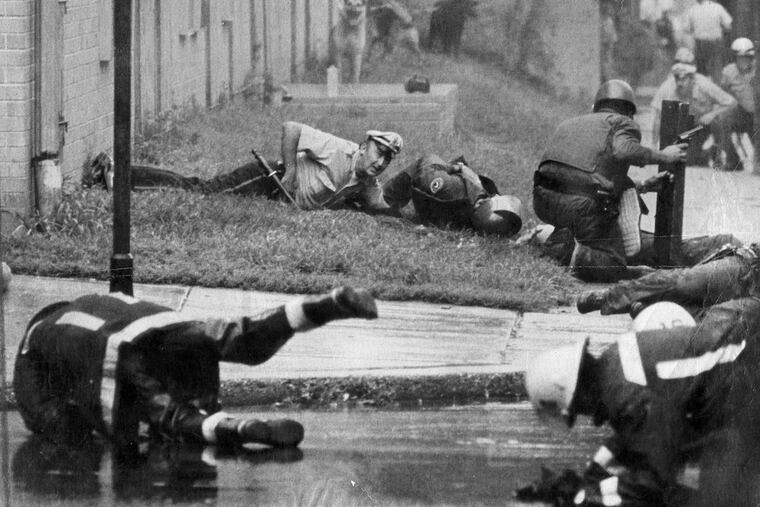Last member of MOVE freed on parole in death of officer
Charles Sims Africa was one of nine MOVE members convicted of a third-degree murder for the death of Officer James Ramp.

Charles Sims Africa, the last member of MOVE to be behind bars for the 1978 shootout that killed Philadelphia Police Officer James Ramp, was released from a Pennsylvania state prison Friday.
A Department of Corrections spokesperson said the 63-year-old Africa was released from State Correctional Institution Fayette, south of Pittsburgh, early in the day and will be on parole supervision for the rest of his life.
Brad Thomson, his lawyer, posted a photo on Twitter of a smiling Africa apparently seated in a restaurant holding a menu.
“Chuck Africa of the #MOVE9 is now free after nearly 42 years behind bars! All of the #MOVE9 are now out of prison!” Thomson wrote.
Africa was one of nine MOVE members convicted of third-degree murder for the death of Ramp and seven counts of attempted murder following an Aug. 8, 1978, shootout with police at the radical group’s compound — a three-story Victorian twin at 33rd and Pearl Streets in Powelton Village.
Last month, Delbert Africa was the second to last of the nine to be freed on parole. Two died while serving their sentences.
A confrontation had been building for several years between MOVE, which espoused revolutionary ideas and back-to-nature philosophies, and its neighbors, who complained that the place smelled of excrement and garbage, and was filled with rats and several dozen dogs. A city health inspector was turned away, and the group surrounded the house with an eight-foot barricade. A half-dozen members staged a show of force in 1977, brandishing rifles and handguns.
On the morning of Aug. 8, 1978, hundreds of police officers assembled for a confrontation.
“Suddenly, gunshots came from the basement window of the MOVE house," former Daily News reporter Kitty Caparella wrote in a 2010 recollection. “From a third-floor apartment window, I looked down to where stakeout cop James Ramp was slowly kneeling to take a shooting position on the sidewalk with others. Ramp abruptly fell backward, blood coming out of his mouth.”
Ramp, 52, a husband and father of a teenage boy, was crouching forward to peer around a pole when he was stuck in the chest by a bullet.
James McNesby, president of Fraternal Order of Police Lodge 5, said Friday in a statement reacting to Africa’s release: “When days like this happen, our hearts ache for our fallen-hero James Ramp and his family as they’re revictimized every time a MOVE member is released from custody.”
The 19-week trial in 1980 of the nine MOVE members was at the time the longest and most expensive in Pennsylvania history.
MOVE members acted as their own lawyers for the first several weeks. The group members claimed they fired no shots that day. A defense attorney later suggested that police had shot Ramp by mistake and planted the rifle that turned out to be a ballistic match for the weapon that killed Ramp and wounded two other officers. Police said they recovered 11 rifles and handguns and 2,000 rounds of ammunition from the house.
The remaining free members of the group relocated to the 6200 block of Osage Avenue. MOVE continued to antagonize neighbors and clash with the city, setting the stage for the disastrous May 13, 1985, confrontation in which the city dropped a bomb on the group’s house. The ensuing conflagration destroyed more than 60 homes and killed 11 people, including MOVE founder John Africa and five children.